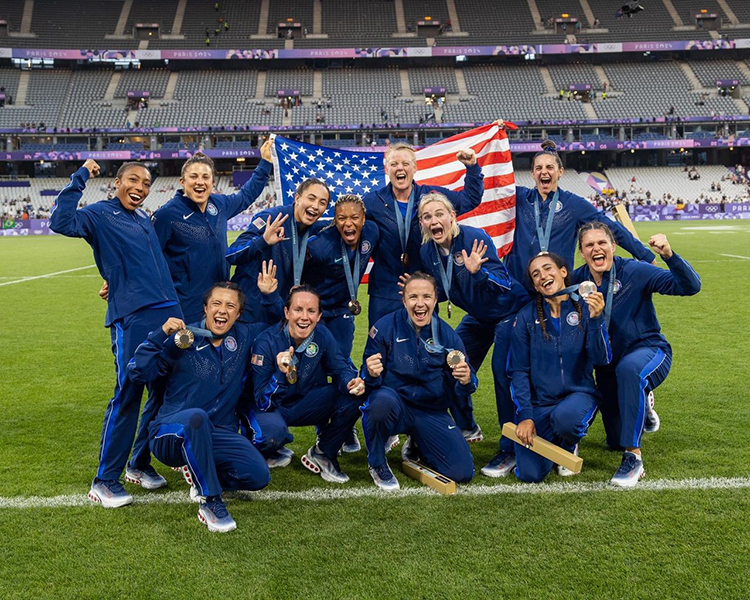
By Eli Rubenstein,
International March of the Living
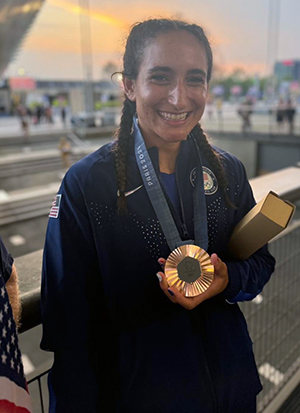
PARIS, France (August 9, 2024) — Sarah Levy took part in the 2014 March of the Living as part of the March of the Living Western Region Delegation. Here at the Paris Olympics, she was a member of the Bronze Medal-winning American team in women’s rugby. Levy is a resident of San Diego, California
Eli Rubenstein: Good afternoon, Sarah. Thank you for taking the time to be interviewed, and congratulations again on this incredible achievement. How are you feeling right now? And what was your feeling right after the experience when you received the medal?
Sarah Levy: Well, I don’t think it will feel real for a while. It always seemed like, going into it, it always felt like a pedestal that we would never get to. Sometimes in my brain, it was the goal, but to get it just seems just like that. The whole process of everything I did in the past three years just seems to all fit together so well. Everything makes sense and everything happened for a reason. Everything was working toward this eventual outcome.
ER: And how many years were you working towards that goal?
SL: Well, since Tokyo, I mean the team as a whole, we’ve been building a culture and a mindset going into this Olympic cycle of the team we wanted to be. We created a set of values that we wanted to follow as a team, which were: courage, selflessness, love, work ethic, and resilience. And those values guided our every day. And we created this culture surrounded by that – keeping accountability and, we were trying to inspire the next generation by getting a medal. And it just brought so many eyes to the sport – just getting bronze – that it really opens so many doors for the future, and for LA 2028.
ER: And where did those values come from?
SL: We got together as a team, and we got into groups and just tried to brainstorm what we would want five values to be. And it was a lot like, okay, one group chose these values, explain what you mean by each of these words. And then we found the five words that resonated with the whole group in a way that we could have the buy-in. And then once we had those, then we’d have awards every season for who kind of showed that value in a full capacity and everything. It was just a cool culture mindset.
ER: Was there a particular value that you suggested, or you gravitated towards among the values you mentioned?
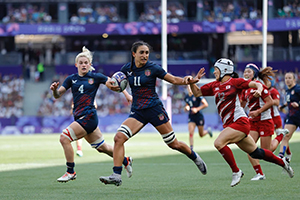
SL: All of them showed up during different times of the cycle. There were times that I had to be more resilient after not making selections. There were times that certain games or tournaments were really make-or-break for me. Whether I performed well or did not would determine whether I’d make the next roster. And I had to instill a lot of courage in myself to go out there and play, even with the fear of possibly not getting selected. And all the love for your teammates, finding the love for the game, even when things aren’t going your way. Just like all of them (the values). You show them throughout the season, throughout the day.
ER: And do you think those values help propel your team to the bronze medal?
SL: Oh, yes. We do a lot of practices of repeating words and values to try to, kind of like a meditative practice, to try to center us back. And I think even just doing that and keeping being reminded of the values we have, really gets you more centered and more grounded and living each action through those values.
ER: That’s wonderful to hear that. So, when you were standing on the podium getting the medal, what did that feel like? That moment?
SL: It was really just the support. I could see my friends in the crowd and my boyfriend in the crowd, and looking at them, just seeing how proud they were, that was just really emotional. And then even standing next to the other teams, and we play against these teams every month, we go to a different location. Rugby’s such a great culture where you have so much respect for your opponents. And so even just being on that podium with Canada and New Zealand and knowing what Canada’s gone through the past three years too, to be there on the podium with us, for us to have been on the podium, just the rugby community in general, we celebrated each other. It was just such a unifying feeling that we’re the three teams that made it, and just so much respect for each other. Because Rugby Sevens is such a game where anyone has a shot at winning a game, so you really respect your opponents. There’s no easy game in Sevens anymore. They’re all hard. Everyone’s bringing something different. So, it causes you to just have a lot of respect for your opponents.
ER: So, it sounds to me like it’s a beautiful model of sportsmanship
SL: Just rugby in general is like that. Everyone’s very inclusive. Everyone’s really welcoming at all levels.
ER: And you folks were the underdogs, right?
SL: Yes. Australia, I don’t think was expected to be, it wasn’t on our bingo card that we would play Australia for third. I think they’ve been the favorite for these whole past three years. They’ve been in the first and second spot at all of our tournaments. We hadn’t beat them in a year or so, so it’d been a long time since we had beat them. And yeah, I don’t think anyone expected them to even just be in the bronze medal match. So, it was just unreal that we were able to finish the game like that. But I think we put in so much hard work through the season to make sure that our fitness could be unbeatable. And I think it really showed in that match, we did a lot of heat acclimation getting ready for this heat wave. We did a lot of playing with conditioning that we’d never done before, insane levels of fitness training that I think really showed in even in that last run.
ER: Was there a moment when you were playing where you just felt, wow, I did it right? Did I make the right move? Like, I’m so pleased with myself that I was able to achieve something in that moment?
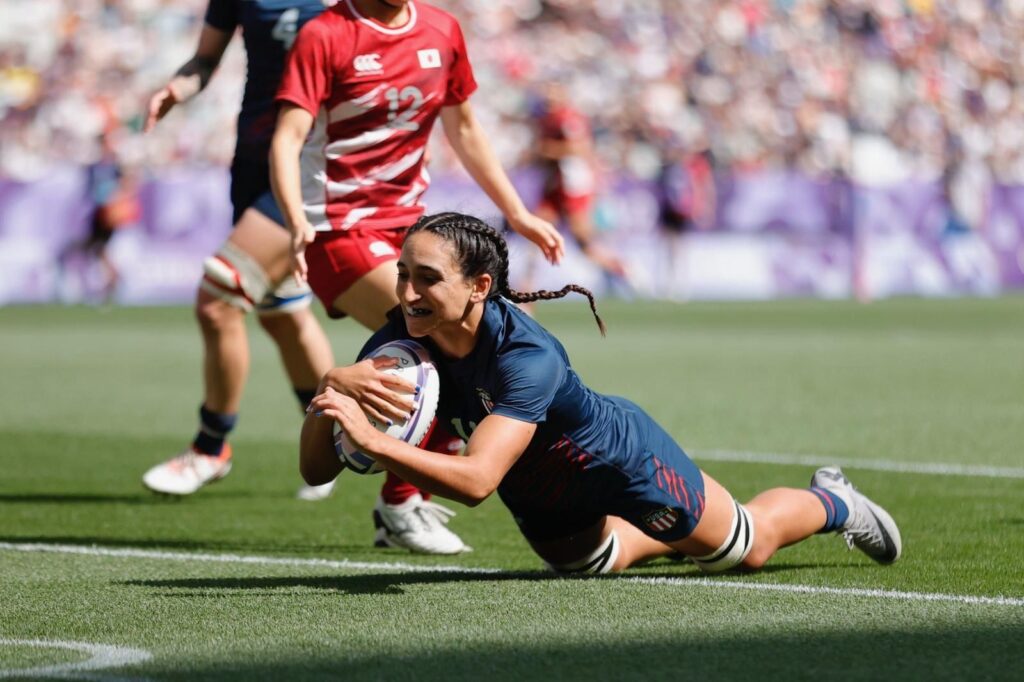
SL: Yeah, the first game I played against Japan, and we had actually conceded a try to them right off the bat. It was like, okay, this is going to be a hard game. We’ve got to pull together. Japan’s really a hard team, they work hard for each other. They’re doing things that other teams aren’t doing. And the first game is out, all the people’s adrenaline is up. So, nerves were really high, especially for a couple of us for whom it was our first Olympics. And being out in front of that many people, it was just insane. And then right after that first try, when they scored eventually, there was a moment that I got the ball, and I had just thought about what we were doing in practice. And my teammate Sammy, was on my outside, and I remember her telling me what to do. We had made a call for a certain play, and I remember her telling me what to do, and I was like, okay, yeah, this is exactly what we do in practice. I’ll just nail this, and once I make my move, she’ll be free, and then she’ll be able to score. And I went to make my move, and I realized that they didn’t bite on me or anything. So, then I was like, okay, I guess I’ll just keep going. And then it ended up being there for me, and I just ran all the way. And I don’t think I’m the fastest one – I’m in the bottom tier of speed wise on our team. So, I was like, this is a long way for me to run. I’m for sure going to get caught. But then I was able to eventually score. And I just remember diving into the tri zone and there being the Olympic rings just painted where I ended up scoring the try, and I just laid there for a second, looking at them and feeling the crowd. And it was just the most adrenaline I felt probably ever!
ER: What a beautiful moment. What a beautiful memory. You should cherish it for the rest of your life. What was the general atmosphere like for you at the Olympics?
SL: Going into the Olympic Village, I was a little nervous about what tensions were going to be like with all the countries together all at once. I was definitely nervous going into it. And then I got here, and it just felt almost like a utopian society where it doesn’t feel like there are any politics or anything political going on. It feels like everyone is living in harmony, at least from the surface level that I could feel.
ER: Well, it’s nice to hear that. More broadly, you are an American, you’re a young Jewish woman. You’re representing your country; you’re representing your people. How does that feel in general?
SL: Well, there aren’t that many Jewish rugby players. One of my assistant coaches, Zach, is also Jewish, and he played in Rio Olympics. But I know having a Jewish last name that people probably know that I’m Jewish. And I think that in general, younger girls or boys who are Jewish, and are interested in rugby, it just gives a little bit more representation that there is someone who’s Jewish on the team. Just maybe it makes [a young Jewish girl or boy] feel a little more comfortable with thinking like “oh, I grew up with a similar upbringing to her, and with similar values.” So that can inspire others to do the same move from the Jewish community.
ER: So, let’s go back a little to your history. You were born in South Africa, but moved to Israel, then to San Diego where you were brought up. Did you have a Bat Mitzvah?
SL: Yes.
ER: And did you do a good job?
SL: I’d like to think so, but I was also 13. Yeah, it was nice. My parents told me, since we had a lot of friends and some distant family in Israel, they’re thinking how meaningful it would be if I had my bat mitzvah in Israel.
ER: Where exactly was it in Israel?
SL: It was at Moshav Shorashim in the North, I read from the Torah, and I did a D’var Torah. It was about Joseph forgiving his brothers.
ER: That’s one of the most beautiful portions in the Torah.
SL: Yeah. I really liked it because I always loved that story, the story of Joseph and his brothers.
ER: So, was your D’var Torah about Joseph forgiving his brothers?
SL: Yeah, a little bit. I think also about change in general, it was about how change is scary but there’s also so much beauty in it.
ER: So, change is scary, but there’s so much beauty in it as well – I love that. And the brothers changed, and they learned not to repeat the mistakes of the past, and Joseph learned to forgive them.
SL: Change. I think as a kid, I really didn’t like change in general, so I think maybe someone guided me to talk about it too. Which was really helpful for me.
ER: That’s wonderful. So, was it a meaningful experience to have your Bat Mitzvah in Israel? Did you have family there? Did you have family come from Israel? Or other places?
SL: Yeah. I had family come from South Africa, and yeah, it was really meaningful. Honestly, as a kid, I was more scared because I was like, oh, they actually all speak Hebrew here. They all will know if I make a mistake.
So, it actually made me a little more nervous for it. I was like, oh, my friends who are doing their bar and bat mitzvahs here [in the US], most of the people in the crowd don’t know what they’re saying. So, I was a little more nervous for it, but it was really meaningful. And I think, well, it was my first time back to Israel since I was a kid. So, it was probably my earliest memory of it in general.
ER: And it was meaningful because all your family came together – and how often do you have that experience? Right?
SL: Yeah. It made it an easier trip for my grandparents from South Africa. It was a good meeting place. And then we were able to tour around afterward and spend that time with my more distant family. My grandfather is still alive, and he lives in South Africa still. I’m hoping to visit sometime soon just with rugby, it’s been so crazy.
ER: Was he able to watch your victory on tv?
SL: Yeah, he was. He sent me an email afterward about how great of an achievement it was. My grandmother’s father- my great-grandfather Louis Babrow – was a big rugby player in South Africa – he mentioned how proud he would be of me, and how big it is for our family to achieve that.
ER: So, your great-grandfather was a professional rugby player to in South Africa. Was that what partially inspired you to get involved in rugby?
SL: Yeah, when I was in college, I saw that there was rugby, and I remember my dad watching some big games every so often, and I knew he had played when he was younger, and I think I wanted the same thing. When I moved to college away from home, away from family, I wanted something that kind of connected me back to my dad. And when I called from college, it would always be something that I would talk to him about, about my games and everything I was learning. I think it was something to connect me back to him.
ER: To your roots. Now, can we talk about your March of the Living experience for a few minutes? So, how old were you when you went on the March?
SL: I was 18.
ER: And you were in high school at the time?
SL: Yeah, University City High School in San Diego. Yeah, it was the last month or two of high school.
ER: And what prompted you to want to go on the trip?
SL: When I was younger, I always read so many books about the Holocaust, and I always was really interested in all the stories and just all the history behind it. I think I really connected to it being Jewish, and I think that I remember hearing about the concentration camps and that I really would want to see them. And I just couldn’t wrap my head around something like that ever happening. So, I wanted to be able to see that and see that history and really materialize it for me.
ER: And the reason you wanted to understand it was because you wanted to understand how it happened to prevent it from happening again.
SL: Yes.
ER: And so, tell me, what was the experience like? And let’s start with Poland. What was your experience?
SL: I remember when I first got there, I was like, oh my gosh, this country is so beautiful. And then as we went through the tour and we went to all these historical sites, there was just all this sadness, a heaviness all around. And it almost transports you back in time to what happened there. You can feel what it would’ve been like back in World War II, overrun by soldiers. It does materialize all the stories that you’ve read about.
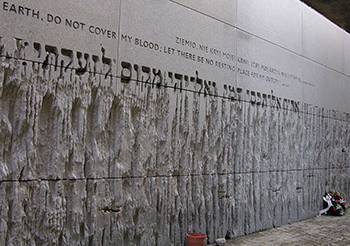
ER: Here is an excerpt from your diary that you wrote in 2014 after visiting the Belzec Death Camp memorial, where some 500,000 Jews were murdered and virtually no one escaped.
Belzec – by Sarah L
April 29, 2014
“The monument we just visited was not like any I’d seen back home. The single passageway and looming walls created an overwhelming experience. All the Jews that arrived at this camp were killed, except for just one. All Jews. All the same fate. No other option. The huge walls in a narrow passageway made me feel the same sense of helplessness.
None of my friends could ever understand the emotional journey on this trip, which made me feel alone, but the people with me on this trip created a loving community and helped me through this incredible experience every day.”
ER: How does it feel reading those words today, 10 years later?
SL: I think my first reaction was, well, it was really cool that you guys still have all of those. That you memorialized my emotions from that time, which is really important. And that also, this specific passage reminded me exactly of that concentration camp in Belzec.
I remember exactly that moment. I can literally see the photograph in my mind and remember exactly that moment when I was there and hearing the story I feel like those memories don’t come up that often, but to read that, that brought it back. Even if I don’t think of them all the time, I still have all these deep-seated memories from that trip. It triggered the emotion of that moment, of shock, of sadness. No one really survived except for one guy that was able to somehow get out to escape.
ER: And then the last paragraph, you talk about how your friends helped you through that day, right?
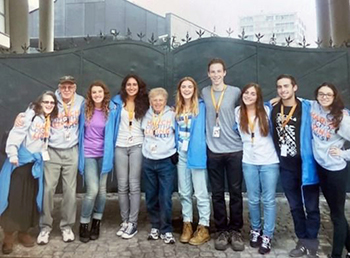
SL: I think that that’s why we see communities that share the same values, because you’re able to have a support system that has more empathy towards how you feel. Whether that’s in the Jewish community or in rugby in general, that you find people that share those values – so that during the hard times they can help lift you up or give you advice or let you know they can understand how you feel.
ER: So, there’s an interesting parallel between being in that experience on the March of the Living with your community 10 years ago and going through the rugby championships with your own fellow players, that you had that sense of comradery and shared values.
Did you travel with survivors?
SL: Yes.
ER: And what was that like?
SL: I remember it being really emotional because got to know this couple (Mike and Manya Wallenfels), they’re part of our group and everything, and then they share their story, and then I remember going to certain sites and then you could see some memories coming back, and them thinking about family members they had and lost. (See profiles of these 2 Holocaust survivors on the March of the Living website here: https://www.motl.org/survivors/miklos-mike-wallenfels/ https://www.motl.org/survivors/manya-wallenfels/
ER: And what was the most meaningful emotional part of your trip to Poland?
SL: Definitely the March from Auschwitz to Birkenau. And I remember because then they had a lot of speeches and everything, and I remember just getting extremely emotional, I think the Prime Minister of Hungary spoke then about the 70th anniversary of the loss of Hungarian Jews in the Holocaust.
ER: And how did the March itself feel, when you’re marching with thousands of kids, from Auschwitz?
SL: It was interesting to be part of such a small group, and then eventually growing into such a big group of Jews from all over, and people from all over. It made you feel like a part of something bigger. I think I ran into someone I knew from one of my sleepaway camps from years back, from those eight years before that. So, it was really interesting to even run into someone I knew all the way across the world.
ER: What was Israel like?
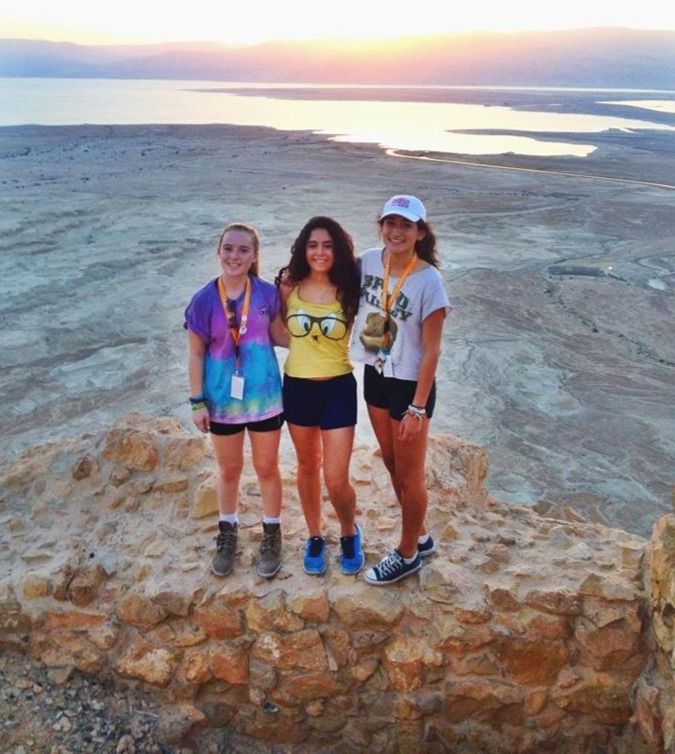
SL: It was very much a complete 180 in emotion from that heaviness and sadness in Poland. It was a great time. It was just so much fun and celebratory. I just remember it being such a great experience. I had been there before, so it did feel a little bit more comforting and more like home.
I made such great friends on that trip. I remember being so much closer to them than I had on a lot of other trips. I made some great connections. In fact, after winning the bronze medal in Paris, a lot of friends I’ve had from the March of the Living reached out to me.
ER: I think it’s great that these deep connections lasted over all these years. These are formative experiences.
Any closing thoughts that you’d like them to take from your example of sportsmanship and comradeship and resilience and courage and love and all those kinds of things? Anything that you’d like them to learn from your experience?
SL: Yeah, I think that whether you’re religious Jew or not, I think I, it’s important to find a community that supports the same values that you like to live by. And when I started playing rugby, I felt like that was a community that it shared a lot of values that the Jewish religion shared, at least to me personally. I felt like it was very inclusive and really welcoming and just overall, it felt like home right from the start, how I felt growing up in a Jewish community. So, I just hope that no matter what you do, that you find a community like that that emulates those same values.
ER: Very beautiful. What does the future hold in store for you?
SL: I’m still in physical therapy school. When I get back, I’ll be starting my last semester and then taking a six-month break from rugby to finish my clinical rotations, and then I’ll finally get my degree and then hopefully training for LA 2028. I want to be a physiotherapist, So hopefully start my full-time career at 32, but I would like to start working part-time in a year or so.
ER: How many more Olympics do you want to go to?
SL: Hopefully just one – I am taking it year by year. I’m for sure going to play one more year – after that I’ll get back to you.
ER: We’re expecting a silver or gold for the next one. You realize that, right?
SL: Yes, always upwards.
ER: You mentioned your boyfriend earlier. What is your boyfriend doing?
SL: He lives in San Diego. He is in the military. I’m trying to get him to start playing rugby. We’ll see what happens. He likes football, so I’d like him to play recreationally, but we’ll see.
ER: Was he proud of you when you got the medal?
SL: Yes. He’s been so helpful this past year by making sure that when I’m tired, he’s made me meals. He’s just been tending to me so well, I am honestly excited for this next month or two that I can, where I don’t have as much stress and I can repay the favor and maybe turn the tables a little bit where I can give back to him, given so much to me in the past year.
ER: Well, that’s wonderful that you’re in such a loving relationship where that’s the way you feel about each other.
Any closing thoughts before I let you get back to your teammates and to the wonderful time in Paris?
SL: Any closing thoughts before I let you get back to your teammates and to the wonderful time in Paris?
ER: What does rugby exactly give you? What feeling does rugby give you – besides your achievements at the Olympics? Playing sport in general, what does that give you?
SL: It gave me an opportunity. I feel like rugby is partially the reason why I chose physical therapy. When I was playing rugby, I noticed all the things that my body could do and how I could improve my body to be even better and just, it made me want to try to use movement to be stronger. So, I would go to the gym every day and lift weights when I’d never even really lifted weights as a girl. I think it just opens so many doors to what your body can do, and you just see it translated right on the field.
So, it’s instant gratification like, oh, I was stronger, so I was able to make that tackle. I think it just gives you way much more body awareness of what you can do and how it can be stronger or faster.
ER: So, if I’m reading you correctly, what I’m hearing you tell me is that not only is rugby physically satisfying, its emotionally and spiritually satisfying – because it not only makes you stronger physically, it makes you stronger emotionally because you feel better about yourself and about the things you can achieve, `That’s a very inspiring message. So, thank you for that. I really appreciate your optimism and your courage and your upbeat attitude. I’m not a young girl, but I’m also inspired!
SL: You can also try rugby as well. It’s never too late.
ER: I get excited by a comfortable chair but thank you.
SL: Me too. Thank you. Me too.
ER: Let me conclude by wishing you a Shabbat Shalom.
SL: You too!
*
Eli Rubenstein is director of education for the International March of the Living.